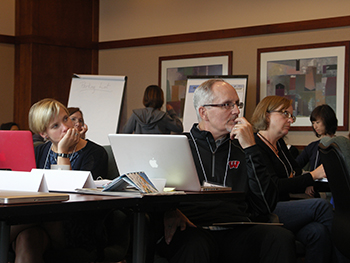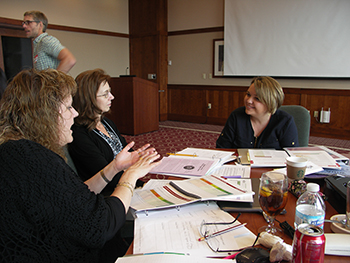WIDA Goes Global with Summer Academy for International Schools
July 30, 2014

The 2014 WIDA International Summer Academy
From Afghanistan to Zambia, international schools are reconsidering their approach to teaching English language learners, and many are looking to tap into WIDA’s expertise.
The 2014 WIDA International Summer Academy, which took place July 14-18 in Madison, Wisconsin, was WIDA’s first professional development academy specifically for international schools. The workshop was designed for teachers to learn how WIDA standards and assessments can meet the needs of English language learners (ELLs) in international schools.
“There is an increased recognition of the role of academic language development and the growing population of ELLs in English-medium schools worldwide,” WIDA Associate Director Elizabeth Cranley said. “The academy is a first attempt to reach some of these educators to share our resources and experience. It is also an opportunity to learn from them about their contexts and how WIDA might better help them meet the needs of their ELLs.”
Historically, international schools have offered high standards of education to expatriates from various countries living in locations around the globe. Recently, many international schools have begun to enroll more children from their host countries. These students are attracted to international schools for various reasons, including the opportunity to learn English, according to Ruslana Westerlund, an English Language Development Specialist and International Development Team Lead for WIDA.
More than 30 educators from schools on five continents attended the WIDA academy. Most, like Cheryl Jones and Ellen Johnston, came to learn the basics about WIDA.

WIDA International Development Team Lead Ruslana Westerlund (right) talks with attendees of the academy, which was designed to teach educators how WIDA standards and assessments can be used to meet the needs of English language learners at international schools.
“I want to get an idea of what WIDA is and what it can do for my school so that I can go into my job with a running start,” said Johnston, who begins a new position in the fall as the K-10 ELL coordinator at the American International School in Abuja, Nigeria.
Jones, who teaches English as an Academic Language at the GEMS World Academy in Etoy, Switzerland, said her school plans to have her train the rest of its staff after she returns from the academy.
“My school just adopted WIDA MODEL, a language proficiency test that helps identify our ELLs and their proficiency levels,” Jones said. “I’m here because my school has identified this as a priority, and now we need to get our staff up to speed on how to use the WIDA tools and get the most out of them.”
Virginia Blais, the coordinator of the English as an Academic Language program at Taipei American School, said her school also turned to WIDA for its language proficiency test in 2012. One year later, her school’s administrators created and instituted a systemized program for its ELLs. According to WIDA’s Cranley, the path from using WIDA MODEL to full WIDA adoption is an increasingly common one for international schools to take.
“There seems to be a growing recognition that a test, which is what usually brings them to us, in and of itself, does not support students or the educators who serve them,” Cranley said. “Hence, the growing interest around standards, instruction, program design, and better understanding assessment data for instructional and programmatic purposes.”
In March 2014, WIDA launched the Wisconsin International Schools Consortium (WISC), a network meant to encourage support, collaboration, and learning between international schools using WIDA products and services. WISC is the next step in a growing partnership between WIDA and the Wisconsin Center for Educational Products and Services (WCEPS), the nonprofit organization that disseminates WIDA products. WCEPS manages the WIDA International School Consortium while WIDA is responsible for future professional learning, such as the International Summer Academy.
Joining WISC gives schools access to support for the MODEL and W-APT assessments, and members can then also purchase the new international version of WIDA’s English Language Development standards. So far, more than 100 schools located in 39 countries have signed up to be a part of WISC, and WIDA is confident the network will grow to incorporate many more of the world’s roughly 8,000 international schools.


